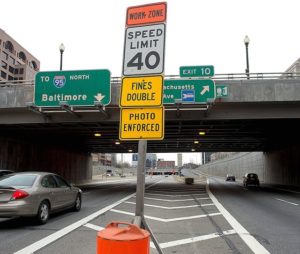Just last month we blogged about the trouble with Baltimore speed cameras. But B-more isn’t the only metropolitan area having issues with these money-making headaches. Metro P.D. Sergeant Mark Robinson tried to get the city of D.C. to pay attention to the problems with their cameras, but they wouldn’t listen. It wasn’t until he got nailed with one himself and challenged it in court that he found success. And this level of success could be a major problem for D.C. city officials.
 According to the Washington Times, the 22-year police force veteran had tried to get the city to back up on more than 100,000 tickets, tickets that he said were the result of flawed speed cameras. When they wouldn’t listen, and when he got a ticket himself at the Third Street Tunnel, he decided to take a “different course.”
According to the Washington Times, the 22-year police force veteran had tried to get the city to back up on more than 100,000 tickets, tickets that he said were the result of flawed speed cameras. When they wouldn’t listen, and when he got a ticket himself at the Third Street Tunnel, he decided to take a “different course.”
A hearing examiner sided with Sgt. Robinson. He found that the cameras were improperly enforcing the speed limit and would be referring the matter to officials for further review. If upheld, his decision could “force D.C. officials to return $1.8 million in penalties associated with more than 14,000 tickets that misidentified the posted speed limit.”
That’s almost $2 million in what the city has long-determined was their rightful revenue.
One of the criticisms of all speed cameras is that, like red light cameras, they are little more than a money maker for the local government. They don’t prevent accidents and are frequently unreliable. In the worst cases, your passing by one of these cameras could be a lottery of sorts, where you never know if you’ll get chosen to pay a ticket, regardless of your speed. It works well for the city budget but not so well for the people.
Sgt. Robinson was one of the principle radar instructors in the automated speed-enforcement program. But he was removed from that unit after he accused the program manager of failing to rescind the defective citations. So, he stood up for what was right in the interest of D.C. drivers and he lost his job.
The issue in this case was that the cameras were enforcing the wrong speed limit, certainly an issue for all of the citations at the Third Street Tunnel, but also likely a problem elsewhere.
The District of Columbia brought in more than $55 million in automated fines last year, including those doled out at the Third Street Tunnel and elsewhere. It makes sense that the city would be reluctant to address concerns about the cameras when they’ve proven to be such a cash cow.
Technology can get it wrong; police can get it wrong. The criminal justice system makes mistakes. If you are accused of a crime, or even a criminal traffic offense in the District or Maryland, you have rights. Your arrest isn’t the end of the road—merely the beginning. Contact our offices today to discuss your case and the legal options available to you.
Leave a Reply